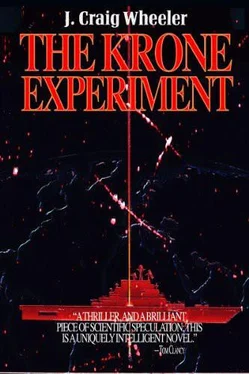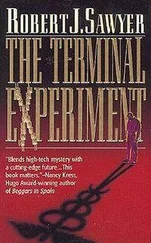“The goddamned Russians have gone berserk! This is the third hot line message from them today. This morning they wiped out the nuclear device that was our protection against their laser. All afternoon they’ve been methodically picking off pieces of space junk, showing what they can do. There are rumors in every major capital that our surveillance system is compromised and that one side or the other is on the verge of a preemptive strike.”
He poked a rigid finger at the paper.
“If we so much as blink we’ll be at war and our NATO allies are panicked to the point where any one of them could push the wrong button.”
He looked around the table. “The Russians are mad, and they are scared, and they are blaming us. I want to know what the hell is going on!”
The President paused and forcibly composed himself. He continued with a quieter but still strained tone. “They seem to think that we have developed and are testing some fantastic new kind of weapon that can be fired through the Earth.”
He turned toward the Director of Central Intelligence at his far right. “Howard, you indicated you could shed some light on this. I hope you don’t mind sharing one or two of your secrets with me before the whole world goes up in a goddamned nuclear war!”
A look of anguish passed over Drefke’s face. The sarcastic attack from his old friend pained him, and he knew the President was not going to like the story he had to tell.
“Mr. President,” his voice quavered, but then grew stronger, “the case I have to present is highly unorthodox. My associate, Mr. Isaacs, has only just this moment returned with the evidence to confirm that we are faced with a peril of unprecedented proportions. Through a bizarre set of circumstances, the Earth itself has become mortally endangered.”
“I’ve always considered nuclear holocaust dangerous,” the President said, his irritation still plainly evident.
“I don’t mean war, but something far more insidious,” Drefke pressed. “If our understanding is correct, the issues we currently regard as crises, including this exaggerated light sabre rattling of the Soviets, become nearly irrelevant.”
Drefke could sense that his strong statement, coupled with the ire of the President, had created a profound air of discontent around the table. He rushed on.
“Our current understanding has been developed by the Office of Scientific Intelligence under Mr. Isaacs with the collaboration of the Jason group chaired by Professor Wayne Phillips who is here to answer questions of a technical, scientific nature that may arise.”
Phillips nodded at the array of severe faces that surrounded the table.
“I will give you a brief overview,” Drefke continued. “Mr. Isaacs will then provide details of the present situation.” He paused and looked at some notes before him.
“In late April, analysis of seismic data from the Large Seismic Array showed a peculiar signal. Closer examination by members of the OSI staff revealed this signal to be quite regular with a period of eighty and a half minutes. Attempts to relate this signal to a man-made origin were unsuccessful. On the contrary, the source of the seismic waves moved along a line that always pointed to the same direction in space.”
“Hell’s fire!” The expletive came from the representative of the Office of Naval Intelligence, a man of stern military bearing. Several people in the room, including the President, flinched at the outburst. Drefke, who had been anticipating it, looked at him stonily.
“You’re talking about the same thing the Navy has been monitoring on sonar,” the Navy man continued. “Fixed orientation and all that. We lost a ship on that mission. What the hell’s going on?”
Drefke looked coolly at the President, confident of his special relationship.
“If I may continue?”
The President nodded and Drefke proceeded to ignore the hot glare of the naval officer.
“It is true,” he said, “that the phenomenon generates an acoustic signal in water that is the counterpart of the seismic signal within the Earth.”
His voice took on a slight condescending note. “My colleagues in the Navy are aware of the phenomenon I’m discussing. They chose not to pursue the matter in a manner that would give any useful insight.” Drefke knew that this simple statement on his part would eventually cause heads to roll in the hierarchy of naval intelligence, including, perhaps, that of his obstreperous colleague at the table. He proceeded with the matter at hand.
“The Navy lost a ship, the Stinson, with tragic loss of life, while monitoring this phenomenon. That relates to another important point. At the same time, also beginning last April, another chain of events was set in motion, which are well- known to all of you here.” Drefke hunched forward, leaning on the table, and looked intently at his colleagues. “I am referring to the Soviet carrier, the Novorossiisk.”
There was a rustle and exchange of glances around the table. Drefke continued.
“You all know what transpired from that seemingly minor incident. The Soviets unveiled their first laser and demolished one of our surveillance satellites. We captured that laser satellite, thanks to the brave action of our shuttle crew, but that led to the launch of a new laser satellite and our nuclear weapon in a standoff that was broken this morning, leaving us in our current state of emergency. We now have reason to believe that the object that damaged the Novorossiisk and, in sad fact, sank the Stinson, was the very thing the Stinson was sent to monitor, the source of the odd seismic and acoustic waves.
“Mr. President,” Drefke faced his commander-in-chief, “we now believe that all these events and several more peculiar happenstances are intimately related, although it was difficult, until very recently, to see the common thread. It is very much to the credit of Mr. Isaacs and his team that the crucial connection was made. The seismic information was used by the OSI to predict that the source of these waves would appear in Nagasaki and Dallas on specific dates last summer, July 7 and July 26, respectively. In each instance, there was some relatively minor, unexplained damage. In each case there was also a death, but neither was directly attributable to the source of the seismic waves. This much information was presented to Jason by Mr. Isaacs in early August. A possible explanation was forthcoming.”
Drefke leaned back in his chair, took a deep breath, looked at Isaacs and Phillips, and then exhaled. He looked keenly at the President.
“Mr. President, I know you have heard the term ‘black hole.’”
“Yes,” the President answered with a note of questioning in his voice, “some sort of gravitational trap, I believe. Supposed to be formed by a collapsing star, if I have the picture right.”
“That is the basic idea,” Drefke assented.
“So what’s the point?” the President demanded. “Are you going to tell me that in addition to the Russians threatening to blow us to kingdom come, we are about to fall into a black hole?”
“Apparently, Mr. President, we are doing so at this very instant.”
This statement brought outbursts of protest from around the table. Drefke looked pained again and raised his voice.
“Mr. President! Mr. President! I beg your pardon! If I could be allowed to explain.”
The President quieted the group. “Russians I can deal with somehow, Howard, but what the hell are you feeding us now?”
“Please consider my position,” Drefke pleaded in the most dignified tone he could muster. “I sympathize with your incredulity, but you have not heard all the arguments. Understand that there is no way to introduce this idea without surprise and shock.”
“All right, all right,” said the President with protesting hands in the air. Then he dropped his elbows to the table and supported his head in his hands muttering, “Jesus Christ!”
Читать дальше











